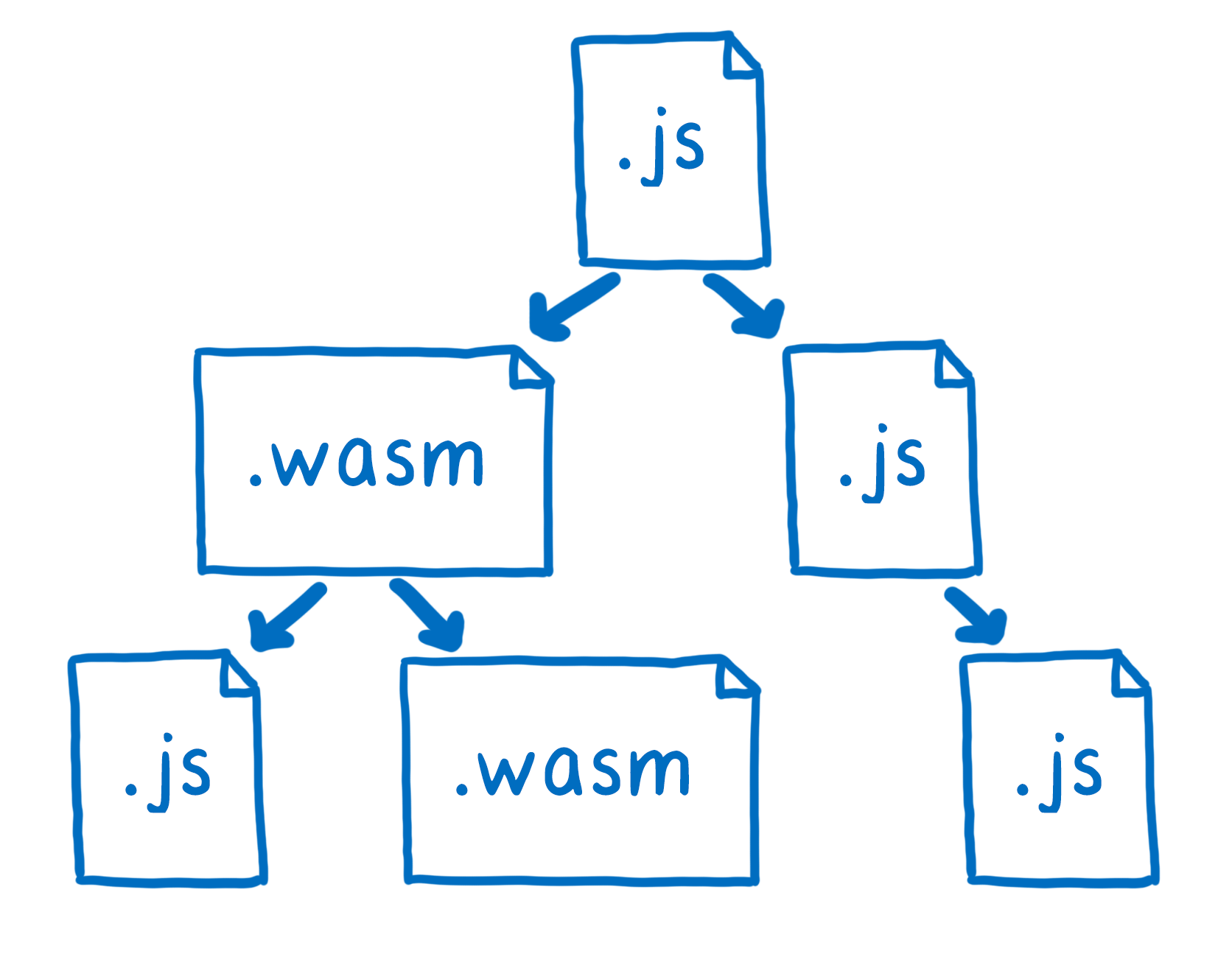04 Webassembly in-depth
Handling complex types
Let's return a String
- wasm only knows some numeric types
- Create String and return pointer
- Read String from heap in JS
Rust
use std::ffi::CString;
use std::os::raw::c_char;
#[no_mangle]
pub extern "C" fn getWelcomeMessage() -> *mut c_char {
CString::new("Hello from Rust!")
.unwrap()
.into_raw()
}
*mut c_char
- Pointer to a mutable c_char
- Representation of C base type
CString::new(s)
- C-Compatible String
- nul-terminated
- No nul bytes in the middle
.unwrap()
.into_raw()
- Get the underlying c_char type
- Convert to pointer
- Hand off memory management
- No GC of this memory by Rust
Memory leak?
- String is on wasm heap
- JS will not do GC for this
Rust
#[no_mangle]
pub extern "C" fn dealloc_str(ptr: *mut c_char) {
unsafe {
let _ = CString::from_raw(ptr);
}
}
unsafe
- We read from an arbitrary pointer
- No type-safety
- No memory-safety
JavaScript
const module = results.instance.exports;
let pointer = module.getWelcomeMessage();
let message = copyCStr(module, pointer);
document.getElementById("container").textContent = message;
function copyCStr(module, ptr) {
let orig_ptr = ptr;
function* collectCString() {
let memory = new Uint8Array(module.memory.buffer);
while (memory[ptr] !== 0) {
if (memory[ptr] === undefined) { throw new Error("Tried to read undef mem") }
yield memory[ptr]
ptr += 1
}
}
const buffer_as_u8 = new Uint8Array(collectCString())
const utf8Decoder = new TextDecoder("UTF-8");
const buffer_as_utf8 = utf8Decoder.decode(buffer_as_u8);
module.dealloc_str(orig_ptr);
return buffer_as_utf8
}
copyCStr
- Get Array from wasm memory buffer
- Read until we get to the first 0
- Decode given bytes as UTF-8
- Call dealloc function from Rust
Exercise Time!
- Return a string from Rust
But how do we pass them into wasm?
wasm-bindgen
- Rust library
- Allow high-level interaction
- Polyfill for features like "host bindings"
- Generate TypeScript typings 😍
wasm-bindgen
- Not "pure" wasm anymore
- Needs bindings on JS and Rust side

Steps
- Ensure Rust can use wasm-bindgen
- Compile Rust with wasm-bindgen
- Import into JS and call it
Importing and activating wasm_bindgen
#![feature(proc_macro, wasm_custom_section, wasm_import_module)]
extern crate wasm_bindgen;
use wasm_bindgen::prelude::*;
Hello World! 😎
#[wasm_bindgen]
pub fn greet(name: &str) -> String {
format!("Hello, {}!", name)
}
format!("Hello, {}!", name)
- Rust Macro
- "!"
- More flexible than functions
- e.g. number of parameters
fn greet(name: &str) -> String
- Behind the scenes there is
js_sys::JsString - JS (utf-16) to Rust (utf-8)
- Converting &str to String
Build Step
- We have to build JS bindings too
- Webassembly Studio will compile this
- We only have to include these in our HTML
Build Step (current)
gulp.task("build", async () => {
const options = { lto: true, opt_level: 's', debug: true };
const data = await Service.compileFile(project.getFile("src/main.rs"), "rust", "wasm", options);
const outWasm = project.newFile("out/main.wasm", "wasm", true);
outWasm.setData(data);
});
build.ts
Compile Step
Service.compileFile(project.getFile("src/main.rs"), "rust", "wasm", options);
⏬
Service.compileFileWithBindings(project.getFile("src/main.rs"), "rust", "wasm", options);
Result
- This will emit both: wasm code and JS-bindings
- Write them in two files instead of one
Build Step (after)
gulp.task("build", async () => {
const options = { lto: true, opt_level: 's', debug: true };
const data = await Service.compileFileWithBindings(project.getFile("src/main.rs"), "rust", "wasm", options);
const outWasm = project.newFile("out/main.wasm", "wasm", true);
outWasm.setData(data.wasm);
const outJs = project.newFile("out/main_bindings.js", "javascript", true);
outJs.setData(data.wasmBindgenJs);
});
HTML
<body>
<span id="container"></span>
<script src="../out/main_bindings.js"></script>
<script src="./main.js"></script>
</body>
Last but not least => JS
const { greet } = wasm_bindgen;
function showGreeting() {
const greeting = greet('JSConf Asia');
document.getElementById("container").textContent = greeting;
}
wasm_bindgen('../out/main.wasm')
.then(showGreeting)
.catch(console.error);
const { greet } = wasm_bindgen;
- wasm_bindgen is provided by main_bindings.js
- We will access wasm through this only now
wasm_bindgen('../out/main.wasm')
- Loading and compiling is now done by wasm_bindgen too
Exercise Time!
- Try passing in Strings
- Incorporate wasm_bindgen
- Play around with it
How to use it for passing in Strings?
wasm-bindgen
- We declare external functions in Rust
- Bindgen will make them available to us
- From window object
Extern block (window)
#[wasm_bindgen]
extern {
fn alert(s: &str);
}
Extern block (more specific)
#[wasm_bindgen]
extern {
fn alert(s: &str);
#[wasm_bindgen(js_namespace = console)]
fn log(s: &str);
#[wasm_bindgen(js_namespace = console, js_name = log)]
fn console_log_u32(n: u32);
}
Exercise Time!
- Create new Rust function that calls a JS function